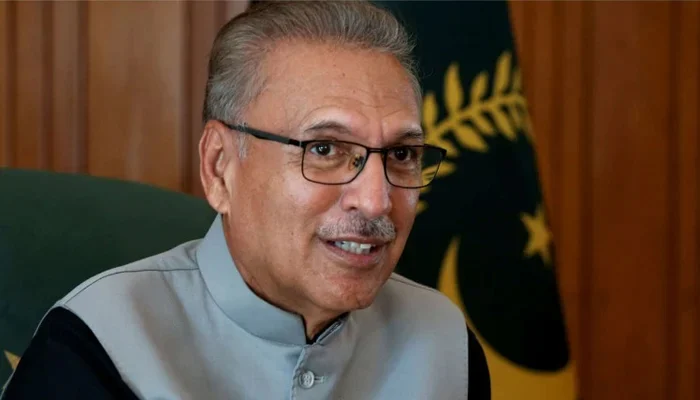- President Alvi advises politicians to not discuss the army.
- “They should be respected,” President Alvi says.
- President says he is “worried” due to increasing polarisation.
LAHORE: President Arif Alvi Friday stressed against making the Pakistan Army “controversial” after the armed forces were criticised by PTI leader Shahbaz Gill.
“Time and again, I have been telling politicians to not bring the armed forces under discussion,” the president told journalists in Lahore.
The president stressed that the armed forces are responsible for the country’s security and in light of their role, politicians should refrain from making the institution controversial.
“It was the armed forces’ job to win the battle against terrorism; they should be respected,” President Alvi said.
PTI Chairman Imran Khan’s chief of staff, Gill, was arrested Tuesday from Bani Gali Chowk after his remarks on a private television channel went viral on social media.
Gill has been charged under serious sections of the Pakistan Penal Code (PPC) after he had attempted to incite hatred within the Pakistan Army while speaking on a private TV channel.
The president noted that he was the constitutional head of all the country’s institutions, and he respects all of them.
“There are talks of the appointment of the army chief and judges. For the judiciary, the chief justice has stated that there should be a standard; I agree with him,” the president said.
CJP Umar Ata Bandial had recently proposed the names of five judges in the last Judicial Commission of Pakistan’s (JCP) meeting, however, they were rejected altogether — and controversy has emerged since then.
‘Caught’ in ‘foreign funding case’
Moving on to the prohibited funding case, the president said that the PTI was “caught in the foreign funding case” as they kept records of their accounts.
The president, explaining the funding received from abroad, said that under United States laws, if a party wants to collect funds, it has to establish a company.
“[The ECP], however, claimed that a ‘company’ sent us funds, whereas, it were those companies which we established in line with the US and Canadian laws,” he said.
In a unanimous ruling, the election commission’s three-member bench had said earlier this month it found that the PTI received prohibited funding.
The case was earlier referred to as the “foreign funding” case, but later the election commission accepted the PTI’s plea to refer to it as the “prohibited funding” case.
As per the 68-page order, the commission states that the Imran Khan-led PTI did indeed receive funding from foreign companies and individuals, which it hid.
The ECP verdict states that the PTI received funds from 34 individuals and 351 businesses, including companies.
Thirteen unknown accounts have also come to light, said the commission in the verdict, adding that hiding accounts are a “violation” of Article 17 of the Constitution.
‘Worried’ due to increasing polarisation
The president, addressing all stakeholders of the country, said that the situation “was not ideal” and that it was crucial for politicians to sit at the talking table.
“Politicians are not sitting together at the talking table; they have to unite. If I don’t see the situation getting better, I will ask them to sit at the table. As the president, I can only ask, not order,” Alvi noted.
President Alvi said he was “worried” that the polarisation was increasing and noted that it had to end in the coming days. “Of course, politicians are not students that we’ll ask them to sit in a classroom forcefully.”
He also said that there was an issue of mismanagement in Pakistan and he told the same to the party chairman, Khan. However, he said that the former prime minister had his own stance.
The president said that he has only rejected four or five of the summaries that the current coalition government has sent him out of the total 85.
“I know my constitutional role.”


 Entertainment2 days ago
Entertainment2 days ago
 Latest News2 days ago
Latest News2 days ago
 Latest News2 days ago
Latest News2 days ago
 Latest News2 days ago
Latest News2 days ago
 Latest News2 days ago
Latest News2 days ago
 Latest News2 days ago
Latest News2 days ago
 Entertainment2 days ago
Entertainment2 days ago
 Business23 hours ago
Business23 hours ago























